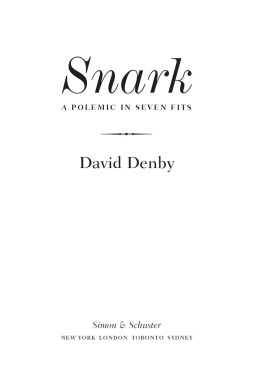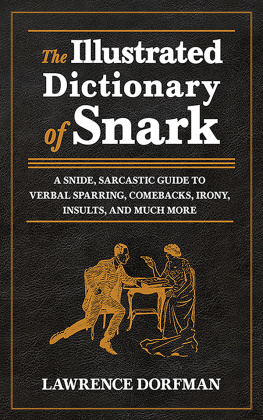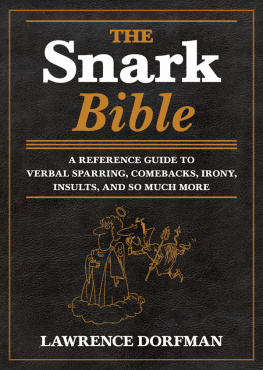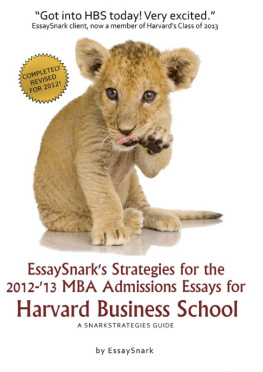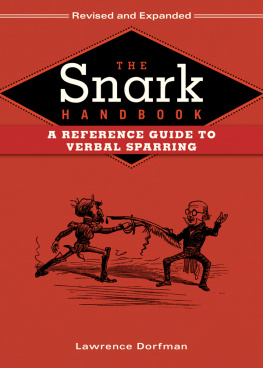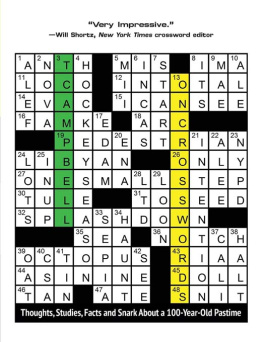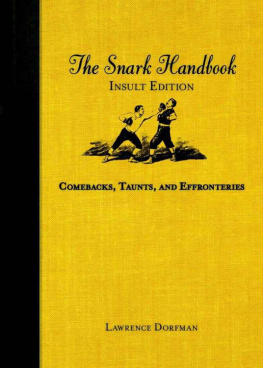All rights reserved, including the right to reproduce this book or portions thereof in any form whatsoever. For information, address Simon & Schuster Subsidiary Rights Department, 1230 Avenue of the Americas, New York, NY 10020.
SIMON & SCHUSTER and colophon are registered trademarks of Simon & Schuster, Inc.
Library of Congress Cataloging-in-Publication Data is available.
THE FIRST FIT
The Republic of Snark
In which the author lays out the terrain of his momentous subject, defines the nature of snark, and distinguishes among high, medium, and low versions of the unfortunate practice.
T his is an essay about a strain of nasty, knowing abuse spreading like pinkeye through the national conversationa tone of snarking insult provoked and encouraged by the new hybrid world of print, television, radio, and the Internet. Its an essay about style and also, I suppose, grace. Anyone who speaks of grace so spiritual a wordin connection with our raucous culture risks sounding like a genteel idiot, so I had better say right away that Im all in favor of nasty comedy, incessant profanity, trash talk, any kind of satire, and certain kinds of invective. Its the bad kind of invectivelow, teasing, snide, condescending, knowing; in brief, snarkthat I hate.
Perhaps a few contrasts will make the difference clear. Jon Stewart and Stephen Colbert can be rough. Like all entertainers, they trust laughs more than anything else, and they wait for some public person to slip a stirrup and fall. Were carrion birds, says Stewart, a man capable of describing Karl Rove as having a head like a lump of unbaked bread dough. But the Stewart/Colbert claws are sharpened in a special way. Even when pecking at a victims tender spots, they also manage to defend civic virtue four times a week. When Stephen Colbert, a liberal, wraps himself in the flag and bullies his guests in the manner of right-wing TV host Bill OReilly, he is practicing irony, the most powerful of all satiric weapons. Attacking the Bush administration, Colbert and Stewart were always trying to say, This is not the way a national government should behave. Snark, by contrast, has zero interest in civic virtue or anything else except the power to ridicule. When the comic Penn Jillette said on MSNBC in May 2008, that Obama did great in February, and thats because that was Black History Month. And now Hillarys doing much better cause its White Bitch Month, right? he was not, putting it mildly, practicing irony or satire. The remark was bonehead insult, but insult of a special sort. It spoke to a knowing audienceto white people irritated by black history as a celebration, and to men who assume an ambitious woman can safely be called a bitch. The layer of knowingness, in this case, was an appeal to cranky ill will and prejudice. Jillettes joke was snark. A question I found as a comment on a right-wing blogIs Obama a fat-lipped niggeror what?is simple racist junk. But a student named Adam LaDuca, formerly president of the Pennsylvania Federation of College Republicans, wrote on his Facebook page that Obama was nothing more than a dumbass with a pair of lips so large he could float half of Cuba to the shores of Miami (and probably would). That remark, in its excruciating humor and its layer of knowing reference, is tin-plated snark (and also racist junk).
Snark is not the same as hate speech, which is abuse directed at groups. Hate speech slashes and burns, and hopes to incite, but without much attempt at humor. Some legal scholarsmost notably, Jeremy Waldron, of New York Universityhave argued that the United States, a tumultuous, multiethnic country with many vulnerable minorities, should consider banning hate speech by law, as some countries in Europe have done. But that is not my concern here; the legal issues lie far beyond the range of this essay, and, in any case, I am against censorship in any form, on the usual ground that it will choke legitimate critical speech as well as vicious rant. I will hunt the snark but leave hate speech alone. I will also ignore the legions of anguished, lost people on Web sites and the social networking site Facebook who are convinced that, say, Barack Obama is the Antichrist (Buraq was the name of Muhammads horse!), and who fly about wildly, like bats trapped in a country living room, looking for a way to release fear. Madness and paranoia are not the same as snark.
Nor am I talking about the elaborately sadistic young sports known on the Internet as trolls. These are technically enabled young men, part hackers, part stalkers, who pull such pranks as teasing the parents of a child who has committed suicide or sending flashing lights onto a Web site for epileptics. The lights may cause seizures. Fun! The trolls have a merry time screwing people up. What they do violates existing statutes, shares one leading characteristic with snarkit refuses true political engagement, the job of getting at the truth of things. All too often, PC tries to rein in humor that might brush against a truth. What Im doing herehunting the snarkis a way of preserving humor. Those of us who are against snark want to humble the lame, the snide, and the lazyand promote the true wits.
Snark attacks individuals, not groups, though it may appeal to a group mentality, depositing a little bit more toxin into already poisoned waters. Snark is a teasing, rug-pulling form of insult that attempts to steal someones mojo, erase her cool, annihilate her effectiveness, and it appeals to a knowing audience that shares the contempt of the snarker and therefore understands whatever references he makes. Its all jeer and josh, a form of bullying that, except at its highest levels, beggars the soul of humor. In the 2000 presidential campaign, Maureen Dowd of the New York Times had Al Gore so feminized and diversified and ecologically correct, hes practically lactating in one column and buffing his pecs and ridging his abs in another column. Which was it? Effeminate or macho? Snark will get you any way it can, fore and aft, and to hell with consistency. In a media society, snark is an easy way of seeming smart. When Harvard professor Samantha Power resigned from Obamas campaign on March 7, 2008, after calling Hillary Clinton a monster, Michael Goldfarbs comment, on the blog of the conservative magazine the Weekly Standard, was Tell us something we dont know. Powers remark is a plain insult; Goldfarbs, with its cozy we, which adds a twist of in-group knowingness, is snark. Snark doesnt create a new image, a new idea. Its parasitic, referential, insinuating.
Of course, snark is just words, and if you look at it one piece at a time, it seems of piddling importance. But its annoying as
The practice has often been mislabeled. Snark is not the same thing, for instance, as irreverence or spoof. Ive heard the morally outraged satirist Lenny Bruce described as a pioneer of snark, which is absurd. Bruce, in his way, was as serious as the prophet Jeremiah. David Letterman the ironist is snarky; Jay Leno, a straight joke teller, is not. Don Rickles takes on hecklers and insults his audience, but his act is a formal structure whose unvarying rules are known in advance. If he werent vicious, people wouldnt go to hear him. What he does isnt snark; its a harmless, self-contained ritual performed by a cobra with a ribbon tied around its head.


